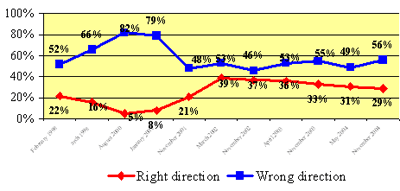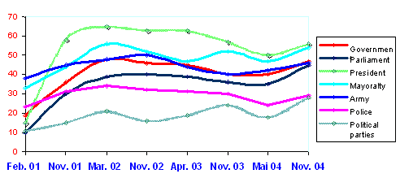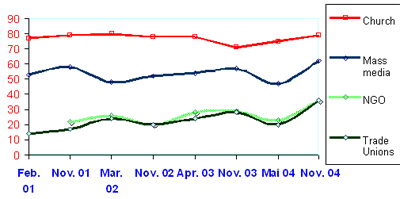ADEPT | Gagauzia 2016 | Presidential 2016 | Elections 2015 | Bashkan 2015 | Gagauzia 2012 | Political Parties
Barometer of Public Opinion: deja vu or… change may be?
Since 1998 Soros-Moldova Foundation launched a project on fair and transparent coverage of the socio-political and economic developments, on access to information for civil society by means of Barometer of Public Opinion. So far, eleven polls were produced the last one being released for October-November 2004. Topics covered by the research are many: political options, rating of the major political parties and leaders, living standards, Government’s economic and social policies, other areas[1]. It has become already a tradition for the results of the Barometer to be released twice a year in spring and fall. Usually this event triggers stringent debates in the political and media circles of the Republic of Moldova.
Several factors contribute to the credibility of the research: 1) a group of well-known independent experts supervise elaboration of questionnaires and validate the results; 2) correctness of the opinion polls conducted by the most credible sociological institutions in Moldova are verified by another institution so as to avoid any distortion; 3) each new opinion poll includes 30–40% of general questions that enable a though analysis of developments and trends in the public opinion, similarly new questions that are high on the political, social and economic agenda are included in the poll; 4) every time new techniques, methods and approaches are used so as to enable the use of the opinion poll results in developing public policies.
Once the results were released on November 16, 2004 media and analysts alike turned their attention to the immediate impact of the results, leaving the analysis of tendencies and changes for later. Still, it is exactly those changes that are of great interest given the upcoming parliamentary elections in Moldova, as well as recent developments as regards elections in Ukraine, Romania, but also Russian Federation, Belarus and Georgia.
The latest Barometer clearly shows a change in peoples’ attitudes as regards country development. Commencing February 1998 opinions on this issue teetered. Throughout 1998–2000 the number of respondents who believed Republic of Moldova stepped on the wrong path surged from 52% to 82% and dropped in 2002 to 46%.
Table 1. Attitudes on the country development (1998–2004)

During the time of major social transformations individual values take the centre stage, which are closely related to the social values. Cultural and spiritual changes, that is shifts in values, stem from changes in public administration, economy, technological or political developments. In this respect, of special interest are the results as regards confidence in public and private institutions. This specifically refers to the support to domestic policies that determine the degree of political stability in the society as well as the level of democracy in the country. The confidence in various state institutions (Government, Parliament, Presidency) as a rule depends on the social-political situation and manipulation of public opinion.
For instance in 1998 the opinion poll conducted in March showed that confidence in the Presidency was 57%, Government 30%, and a low one in Parliament 16%. Things changed in 2001 on the eve of parliamentary elections when confidence in President was only 15%, in Government — 19%, Parliament — 10%. Table 2 illustrates how things evolved since 2001.
Table 2. Confidence in state institutions (2001–2004)

In 2004, out of all public institutions citizens trust the President (56%) and mayoralty (54%) the most, both registering a 6% surge as compared to May 2004. Also surging is the confidence in media with 62% of the respondents having a somewhat or high confidence (15% increase). However, during those years the church has been the most trusted institution. (Table 3).
Table 3. Confidence in civil society institutions (2001–2004)

The latest survey indicates what 52% of the respondents are not happy with the current economic situation in the country. Interestingly, different categories of respondents see different solutions. In general, 38% view that a better enforcement of the laws is the solution, 36% developing industrial enterprises, 35% see the solution in fighting crime. Respondents in rural areas see the solution in supporting farmers — 38%. At the same time, 21% of the young respondents age 18–29 see the solution in changing the country leadership.
In a related note, given the approaching elections the last opinion poll shows an increased interest in politics, i.e. 10% over May 2004. Thus, 28% of the respondents say they are interested or very much interested in politics. Respondents age 45–59 years are the most interested in politics (32% are interested or very much interested), as are those in the urban area — 31%.
As for confidence in political figures, several of them registered an increase over May 2004 and even 2003, namely one of the leaders of “Moldova Democrata” — Dumitru Braghis (21% have a high or very high confidence, as compared to 19% in 2003 and 12% in May 2004); leader of the Democratic Party of Moldova, Dumitru Diacov (11% as compared to 9% in 2003 and 5% in May 2004); one of the leaders of the Social-Democratic Party of Moldova Oazu Nantoi (currently 19%, as compared to 14% in 2003 and 13% in May 2004); Parliament Speaker, Eugenia Ostapciuc (currently 30%, over 26% in 2003 and 23% in May 2004); leader of the Christian Democratic Peoples’ Party, Iurie Rosca (currently 17%, over 14% in 2003 and 10% in May 2004); leader of the Social Liberal Party, Oleg Serebrian (currently 14%, over 9% in 2003 and 8% in May 2004). The only one to see a decline in the rating was Prime Minister Vasile Tarlev (33% as compared to 44% in 2003 and 43% in May 2004). Vladimir Voronin enjoys the highest rating with 59%.
If Parliamentary elections had to be held in Moldova next Sunday, 62% of the respondents would vote for the Party of Communists. Those are people over 45 having a low or average income and incomplete secondary education.
The great majority of citizens (86%) believe the President should be elected by all the citizens, while 35% consider that President Voronin has the greatest chances to be elected as the next President after 2005 parliamentary elections.
Noteworthy, the last Barometer takes a closer look at the swing voters as well as factors that influence citizen’s choice in elections. Many more respondents decide whom to vote during the electoral campaign or even on the eve of elections. This explains the growing interest towards media that wields a heavy influence on the voter’s choice.
Party of Communists and Christian Democrats have the most loyal supporters and potential voters. Still, the two parties have the lowest potential to attract the votes of the swing voters, i.e. about 25%. In contrast, Democratic Moldova might attract up to 50% of the swing votes.
Albeit many analysts interpret electoral options “deterministically”, the opinion poll provides a wide berth for forecasts as regards the upcoming parliamentary elections. Firstly, it is clear that electoral context and observance of the “rules of the game” would have a crucial impact. An illustration to this effect is Ukraine where people no longer accept deviations from democratic norms. Secondly, there is a huge gap between voters’ expectations and contestants’ ability to keep up their promises mode in elections. Thirdly, it is hard to assess at the moment the possible impact of the foreign influence on the election results. Fourthly, “seasonal” differences in the respondents’ options and attitudes are too obvious. Opinion poll clearly shows a dependence on migration in and out. That is why the timing of elections would prove crucial in elections.
- ↑ The last opinion poll was conducted throughout October 26 — November 10, 2004 on a sample of 1,446 people from 81 localities, representative for the adult population of the Republic of Moldova (excluding Transdnistria). The maximal sampling error ±2.6%.


